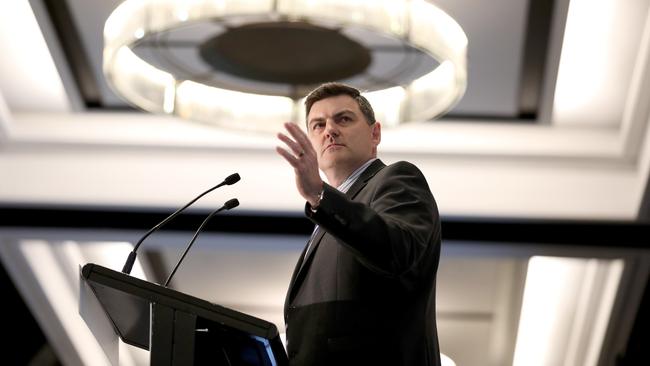TransGrid tips lower prices for electricity
NSW power network operator TransGrid says people should enjoy lower power bills flowing from a reduction in wholesale prices.

NSW power network operator TransGrid says Australians should enjoy lower power bills flowing from a 40 per cent reduction in wholesale electricity prices during the coronavirus pandemic, but that power usage by the construction sector and heavy industry has surprisingly held up demand.
Chief executive Paul Italiano said energy consumption in some parts of Europe had fallen up to 30 per cent since February as countries went into total lockdown, but he said Australia had only experienced 5-10 per cent falls in demand.
Demand at the peak times since the onset of the pandemic is down by about 10 per cent, while average total weekly consumption is down about 5 per cent.
“That is due to the sensational way this crisis has been managed (by governments). Construction has continued to operate and that has suppressed the reduction in energy consumption,” Mr Italiano said, noting aluminium smelters, paper mills and goldmines were also continuing to operate.
“That is a direct economic benefit for the country. The intervention by government has been beneficial for consumers in a way they don’t see.”
TransGrid is the largest high-voltage electricity transmission network in Australia’s National Electricity Market by electricity transmitted and helps supply power to more than three million homes and 600,000 businesses.
Wholesale electricity prices have been falling since October last year due to a range of factors, including lower wholesale gas prices and the ramp-up of renewable energy projects, but the fall has been accelerated by the economic chaos caused by the coronavirus.
Mr Italiano said it was important the 40 per cent reduction in wholesale market prices — which represent the largest component of retail electricity bills — flowed through the supply chain to the consumer. “As this goes on, prices will fall naturally, quite dramatically,’’ he said.
“If you see a sustained reduction in economic activity, which is now a likely prospect, there will be a correlation in electricity demand and a lower electricity price.”
East coast electricity and gas prices fell to their lowest levels in four years in the March quarter and consultancy RepuTex has claimed the former could fall by 20 per cent over the next two years as the global economy enters recession.
A mooted move by Kuwait’s Wren House Infrastructure Management group to quit its 20 per cent stake in TransGrid is set to shake up the ownership of the NSW group, but the pandemic has thrown the timing of the deal into doubt.
Prior to the coronavirus shutdown, speculation centred on Canadian pension giant OMERS being the frontrunner, but OMERS also owns London City Airport, which has been hit hard by the coronavirus shutdown.
“I am well and truly aware of the market speculation that there is a transaction in the offing. But I have no direct information or knowledge,’’ Mr Italiano said.
He said the virus would not affect TransGrid’s mooted multi-billion-dollar growth pipeline.
“Our investors are experienced, global infrastructure investors. You don’t invest unless there is a clear benefit for consumers and the market. These guys value their reputation,’’ he said.
“These projects have been identified by typically independent government bodies to facilitate transitions to new forms of energy or to properly operate the power system going forward. These are investments for 50-70 years. So the COVID-19 impact is quite short term … What could be affected is the date.”
At the end of March the Australian Energy Regulator approved the so-called Regulatory Investment Test for Transmission for a project to upgrade the power transmission link between Queensland and NSW, which is expected to unlock and share cheap renewables more efficiently between the two states.
Known as the Queensland-NSW Interconnector project, the AER’s decision allowed the project to move to the next stage of development.
TransGrid has also been restoring its network in the NSW Snowy Mountains that was badly damaged during the summer bushfires. Mr Italiano said the coronavirus had forced TransGrid to use more expensive local materials in the rehabilitation at an additional cost of $1.5m but said it was “the price of continuing to do work in this economy”.


To join the conversation, please log in. Don't have an account? Register
Join the conversation, you are commenting as Logout